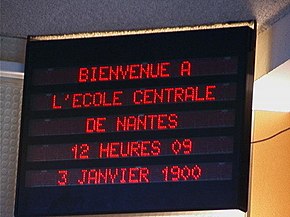
The term year 2000 problem,[1] or simply Y2K, refers to potential computer errors related to the formatting and storage of calendar data for dates in and after the year 2000. Many programs represented four-digit years with only the final two digits, making the year 2000 indistinguishable from 1900. Computer systems' inability to distinguish dates correctly had the potential to bring down worldwide infrastructures for computer reliant industries.
In the years leading up to the turn of the millennium, the public gradually became aware of the "Y2K scare", and individual companies predicted the global damage caused by the bug would require anything between $400 million and $600 billion to rectify.[2] A lack of clarity regarding the potential dangers of the bug led some to stock up on food, water, and firearms, purchase backup generators, and withdraw large sums of money in anticipation of a computer-induced apocalypse.[3]
Contrary to published expectations, few major errors occurred in 2000. Supporters of the Y2K remediation effort argued that this was primarily due to the pre-emptive action of many computer programmers and information technology experts. Companies and organizations in some countries, but not all, had checked, fixed, and upgraded their computer systems to address the problem.[4][5] Then-U.S. president Bill Clinton, who organized efforts to minimize the damage in the United States, labeled Y2K as "the first challenge of the 21st century successfully met",[6] and retrospectives on the event typically commend the programmers who worked to avert the anticipated disaster.
Critics argued that even in countries where very little had been done to fix software, problems were minimal. The same was true in sectors such as schools and small businesses where compliance with Y2K policies was patchy at best.
- ^ also commonly known as the year 2000 bug, Y2K problem, Y2K scare, millennium bug, Y2K bug, Y2K glitch, or Y2K error.
- ^ Committee on Government Reform and Oversight (26 October 1998). The Year 2000 Problem: Fourth Report by the Committee on Government Reform and Oversight, Together with Additional Views (PDF). U.S. Government Printing Office. p. 3. Archived (PDF) from the original on 2021-07-20. Retrieved 2021-06-07.
- ^ Uenuma, Francine (30 December 2019). "20 Years Later, the Y2K Bug Seems Like a Joke—Because Those Behind the Scenes Took It Seriously". Time Magazine. Archived from the original on 2021-09-30. Retrieved 2021-06-07.
- ^ "Leap Day Tuesday Last Y2K Worry". Wired. 25 February 2000. Archived from the original on 2021-04-30. Retrieved 2016-10-16.
- ^ Carrington, Damian (4 January 2000). "Was Y2K bug a boost?". BBC News. Archived from the original on 2004-04-22. Retrieved 2009-09-19.
- ^ Loeb, Zachary (30 December 2019). "The lessons of Y2K, 20 years later". The Washington Post. Archived from the original on 2020-12-02. Retrieved 2021-06-07.